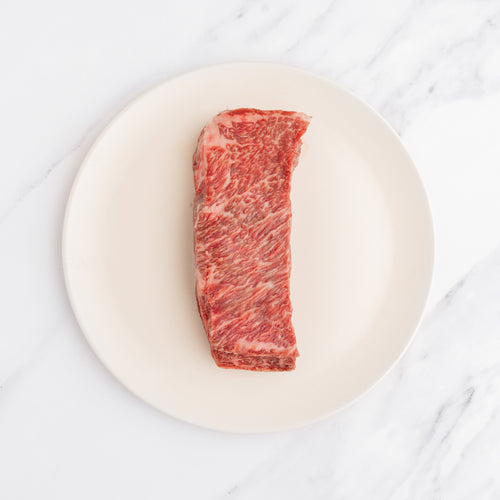
Denver Steak vs. Zabuton Steak: What’s the Difference?
Zabuton? Denver steak? Have you heard of these unique cuts?
Get the lowdown on Denver steaks vs. zabuton steaks, from where the names originate to which one makes the cut for superior dining, at Snake River Farms.
Ever seen zabuton steak on a menu and wondered what it was? Or been perplexed by something called a Denver steak? What’s the difference between these two steaks and where do they come from?
The pros at Snake River Farms love sharing our expertise on beef cuts and how to prepare an amazing meal with any of our American Wagyu beef cuts.
Get the American Wagyu beef lowdown on zabuton vs. Denver steaks, where the names come from and more.
Zabuton in Japanese
In the Japanese language, the word ‘zabuton’ means pillow. It’s the traditional Japanese cushion used for sitting on the floor, and it’s often used in Western circles for soft support while meditating. The name translates to a particularly rare cut of Japanese Wagyu beef that is cut and served in small, neat square cubes that resemble those sitting pillows.
A Surprising Source
Zabuton is sourced from the shoulder or chuck primal. It is a unique cut and is a variation on NAMP 116E with the addition of the neck end of the 116D. It can also be described as the extension of the chuck tail flap/underblade.
The zabuton is sourced from the chuck primal, part of the shoulder. This area is made up of three muscles, the primary being the serratus ventralis. Also known as the Beef Chuck, Under Blade Roast, this area below the shoulder blade continues to the ribs and backbone. Many cuts from the underblade area tend to be tough and are therefore relegated to ground beef or stew meat. But the highly marbled Zabuton is a shining exception.
While the shoulder muscles get a lot more use than other areas of the animal — making them tougher — the specific area that yields a zabuton steak is more of a support muscle that is less used and comprises more intramuscular fat (aka marbling). That makes it a more tender and flavorful steak option. That also makes it a more difficult cut to achieve and as a result, it’s less common in butcher shops and on menus.
The Beef Checkoff Program
Before about 2009, you would have been hard-pressed to find zabuton steaks offered in American restaurants. And no one had ever heard of a Denver steak. Enter the Beef Checkoff Program, established in a Farm Bill from the 1980s and overseen by the USDA and the Cattleman’s Beef Board (CBB). This program supports consumer interest in the beef industry through research, marketing and education initiatives aimed at elevating a consistently high-quality experience of buying and serving beef.
Mile-High Marketing Moniker
One goal of the Checkoff program is to identify and promote “new” cuts of beef. Even though the profession of butcher has been around as long as humans have been eating meat — as in forever — some cuts fall in and out of fashion for the vaguest of reasons. In 2009, the program “unveiled” its latest “discovery”: The Denver Steak. Which is actually the zabuton but with a more American name that played better to focus groups.
Zabuton vs. Denver Steak: Rumble in the Rockies
So, what’s the difference between a zabuton steak and a Denver steak? Or as Shakespeare would put it: What’s in a name? A steak by any other name would taste as juicy.
That’s right: A Denver steak and a zabuton steak are essentially the exact same thing, just with two different names. The fully American invention of the Denver steak has its roots in Japanese culture, much as Snake River Farms American Wagyu beef owes its lineage to the Japanese Wagyu cattle we imported for crossbreeding.
The next time you see a Denver steak on a menu, spark a little dinner table conversation about its origins, and look for it among the American Wagyu steaks from Snake River Farms.



